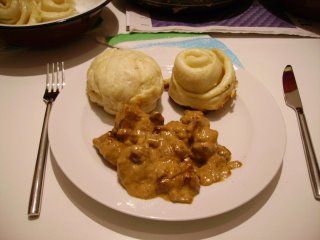 As
I enter the kitchen, Nils (a 26-year-old Philosophy student) has
already filled the air with aromas of sizzling meat. He is busy making
pastry rolls and explains to me how the left pan contains his paternal
grandmother and the right pan his maternal one. Excuse me? Have I
encountered a younger, more charming version of the famous German cannibal? But no, the truth is more banal. The left pan contains Schneckennudeln (in the shape of a snail) and the right one Dampfnudeln (round balls). The different versions were favoured by his two different grandmothers.
As
I enter the kitchen, Nils (a 26-year-old Philosophy student) has
already filled the air with aromas of sizzling meat. He is busy making
pastry rolls and explains to me how the left pan contains his paternal
grandmother and the right pan his maternal one. Excuse me? Have I
encountered a younger, more charming version of the famous German cannibal? But no, the truth is more banal. The left pan contains Schneckennudeln (in the shape of a snail) and the right one Dampfnudeln (round balls). The different versions were favoured by his two different grandmothers. But
he taught himself how to make them while in University. You have to
feed yourself somehow, and spaghetti with tomato sauce can get a bit
boring after a while...
But
he taught himself how to make them while in University. You have to
feed yourself somehow, and spaghetti with tomato sauce can get a bit
boring after a while... The "snail rolls" can be eaten as a sweet pastry or with a savoury sauce. Tonight's sauce consists of beef cubes, onions and rich cream. You are actually supposed to add mushrooms to the mix, as I discovered when I mentioned the lack of vegetables to Nils ("Oops! And it says 'Mushrooms are healthy' on the box!"). But it still tastes
 fine, so they are obviously not an essential ingredient. Who needs vegetables?
fine, so they are obviously not an essential ingredient. Who needs vegetables?Over dinner we discuss the German quote by Feuerbach "Man ist was man isst" (You are what you eat), but Nils doesn't find it a very interesting quote as far as philosophy goes. I think it is all I remember from my overenthusiastic German teacher who was also a philosophy buff. (Although I have a vague recollection of Nietzche and the Ubermensch as well...)
Nils shows me his orange t-shirt he bought in honour of the World Cup and I tell him about the less tasteful orange nazi helmets that are being marketed as football gadgets.
Over coffee I ask if he misses German pastry and he tells me just the other day he had been desperately wandering through Amsterdam looking for something like a Konditorei (for coffee and cakes like the famous Sachertorte).
What about differences between Ossies and Wessies? Is there anything he still notices after being re-united for more than 15 years? Nils tells me that first of all there are some language difficulties, because in the more than 40 years the two parts were separated, some different meanings developed for the same words.
Also, Ossies (he is a Wessie) appear to him to be more group-minded, less individualistic than the West-Germans. Hmmm...should I get an Ossie to cook for me to get their opinion?
(The original post about this meal is from May 09, 2006)
No comments:
Post a Comment